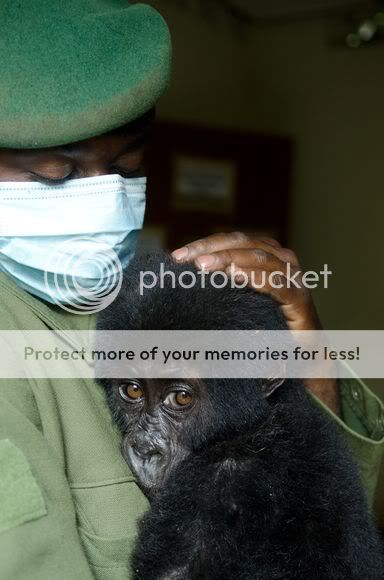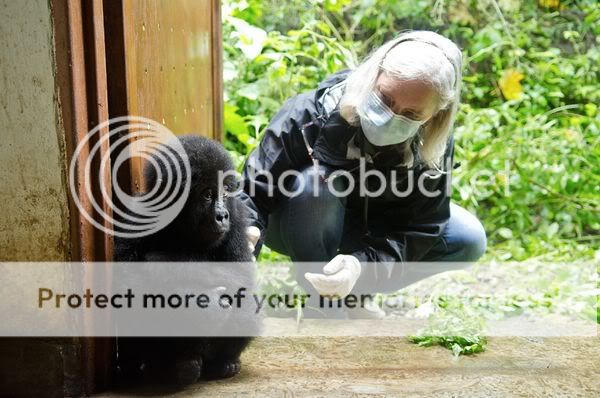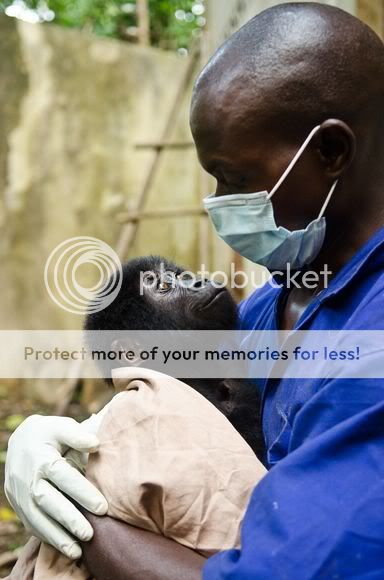It looks like you're using an Ad Blocker.
Please white-list or disable AboveTopSecret.com in your ad-blocking tool.
Thank you.
Some features of ATS will be disabled while you continue to use an ad-blocker.
4
share:
Rangers in the Democratic Republic of the Congo posed as black market buyers and successfully rescued an infant male gorilla, since named Shamavu,
after one of his rescuers, Christian Shamavu (first picture below). Three poachers were arrested. They were hoping to sell Shamavu for as much as
$40,000USD.


The three poachers negotiated with the rangers, who were dressed in plain clothes, to sell Shamavu for $15,000USD. Hiding Shamavu in a backpack, the three poachers met the disguised rangers in a vehicle to make the exchange. Once the poachers were in the vehicle, the rangers, with weapons aimed, locked the doors and drove off with the poachers and baby gorilla, who is believed to be about a year and a half old.

It might take several months, but they are hoping to eventually move Shamavu to the Gorilla Rehabilitation and Conservation Education (GRACE) Center in the DRC. Shamavu will be under quarantine for the first month at Virunga National Park headquarters in Rumangabo.
Pictures: Baby Gorilla Rescued in Armed Sting Operation
I just wanted to share this story with you all. Though heartbreaking, what Shamavu has been through in his short life, I am hopeful that he is in for a brighter future. He is just one small part of a greater story, one that seems to be never-ending, and one that warrants a thread of its own, really. The focus is, usually, on the poachers... more attention needs to be paid to those on the other end, who are just as guilty, if not more.
Supply and demand.
Some further reading, if you're interested:
GRACE Center
Virunga National Park (An update on Shamavu in the blog)
Virunga Gorillas

Shamavu is the fourth baby gorilla Virunga rangers have recovered from poachers in 2011—the highest number on record in a single year, suggesting that baby-gorilla trafficking may be on the rise in the region. "We are very concerned about a growing market for baby gorillas that is feeding a dangerous trafficking activity in rebel-controlled areas of eastern DRC," Virunga National Park Warden Emmanuel de Merode said in a statement.
"We are powerless to control the international trade in baby gorillas, but our rangers are doing everything they can to stamp it out on the ground."

The three poachers negotiated with the rangers, who were dressed in plain clothes, to sell Shamavu for $15,000USD. Hiding Shamavu in a backpack, the three poachers met the disguised rangers in a vehicle to make the exchange. Once the poachers were in the vehicle, the rangers, with weapons aimed, locked the doors and drove off with the poachers and baby gorilla, who is believed to be about a year and a half old.
"We've had infants come to us after confiscation with gunshot wounds, severe pneumonia, deep cuts in their sides from rope leashes," Ramer, regional vet manager for the Mountain Gorilla Veterinary Project, said via email.
"They really go through a lot of horrible stress before the lucky ones are confiscated." Christian believes the baby's mother, and possibly other gorillas, were killed by the poachers who snatched him.
Because gorillas will defend their infants to the death, "it's almost impossible to take a baby gorilla from its family," he said.

It might take several months, but they are hoping to eventually move Shamavu to the Gorilla Rehabilitation and Conservation Education (GRACE) Center in the DRC. Shamavu will be under quarantine for the first month at Virunga National Park headquarters in Rumangabo.
Though heartening, the rescue raises troubling questions about gorilla smuggling for Virunga's LuAnne Cadd. "If four have been caught since April, the question is, how many have been missed?" Cadd said.
Gorillas are among the most protected species in the DRC, and it's illegal to kill or take an individual. The punishment ranges from 1 to 10 years in prison, with tougher punishments imposed if it can be established, for example, that poachers have killed the gorilla mother. Rarely can such killings be proven, however.
End buyers are thought to include disreputable zoos or wealthy people who have personal menageries of exotic animals. But rangers have yet to arrest a single buyer.
Pictures: Baby Gorilla Rescued in Armed Sting Operation
I just wanted to share this story with you all. Though heartbreaking, what Shamavu has been through in his short life, I am hopeful that he is in for a brighter future. He is just one small part of a greater story, one that seems to be never-ending, and one that warrants a thread of its own, really. The focus is, usually, on the poachers... more attention needs to be paid to those on the other end, who are just as guilty, if not more.
Supply and demand.
Some further reading, if you're interested:
GRACE Center
Virunga National Park (An update on Shamavu in the blog)
Virunga Gorillas
edit on 17-10-2011 by JourPolaire because: (no reason
given)
Good job for the rescuers, the animal kingdom vibrates in a way it balances the dominate creatures of the given sphere who like to drop lower....
edit on 10/17/11 by Ophiuchus 13 because: (no reason given)
It amazes me how different tempered the baby gorilla's are than their parents....
These pictures show a curious and happy gorilla, though most of the ones I have ever seen of an adult show it very angry, or displeased with its surroundings...
These pictures show a curious and happy gorilla, though most of the ones I have ever seen of an adult show it very angry, or displeased with its surroundings...
So...in a country were thousands of women as young as 12 year old gets raped on a constant base, where war is going on since over 12 years, where
millions have died...instead of doing something against that, they spent money, time and humans on saving some monkey?
My god...this animal loving bull# is really getting out of hand
My god...this animal loving bull# is really getting out of hand
I am so glad I viewed this thread. I read the title and thought I would be upset.
There was a happy ending and none of the graphic images of animal cruelty that always distress me.
As for the poster who is worried about the young girls who are raped and money being spent on animals - there is focus for every evil in this world. As for spending money on Children who are abused - ask the cabal/illuminati/whatever why they can't let go of some of their millions - to help - oh I don't know - ANYONE!
This is a story with a happy ending and at least one sentient being got some protection and help. I guess when everyone in the world cares - then every living thing will be cared for...
Beautiful photographs that inspired a little bit more of my spirit to keep believing.
Much Peace...
There was a happy ending and none of the graphic images of animal cruelty that always distress me.
As for the poster who is worried about the young girls who are raped and money being spent on animals - there is focus for every evil in this world. As for spending money on Children who are abused - ask the cabal/illuminati/whatever why they can't let go of some of their millions - to help - oh I don't know - ANYONE!
This is a story with a happy ending and at least one sentient being got some protection and help. I guess when everyone in the world cares - then every living thing will be cared for...
Beautiful photographs that inspired a little bit more of my spirit to keep believing.
Much Peace...
new topics
-
The 119th Congress has Officially Opened for Business
Mainstream News: 46 minutes ago -
Here we again... CHINA having mass outbreak of something
Diseases and Pandemics: 49 minutes ago -
Flee from idolatry
Religion, Faith, And Theology: 6 hours ago -
FIEND SLASHED: Sara Sharif’s killer dad ‘has neck & face sliced open with jagged tuna tin lid
Mainstream News: 6 hours ago -
Musk calls on King Charles III to dissolve Parliament over Oldham sex grooming gangs
Mainstream News: 7 hours ago -
Grenfell Tower Fire revisited
Mainstream News: 8 hours ago -
The Why Files Lacerta Reveals the Truth of our Creation
Aliens and UFOs: 8 hours ago
top topics
-
Congress Says the FBI is Covering Up Vital Info on the Jan 5th 2021 D.C. Pipe Bombs at RNC-DNC.
Political Conspiracies: 17 hours ago, 15 flags -
Musk calls on King Charles III to dissolve Parliament over Oldham sex grooming gangs
Mainstream News: 7 hours ago, 14 flags -
The Why Files Lacerta Reveals the Truth of our Creation
Aliens and UFOs: 8 hours ago, 11 flags -
FIEND SLASHED: Sara Sharif’s killer dad ‘has neck & face sliced open with jagged tuna tin lid
Mainstream News: 6 hours ago, 9 flags -
Grenfell Tower Fire revisited
Mainstream News: 8 hours ago, 8 flags -
So, what is really going on in South Korea ?
World War Three: 17 hours ago, 6 flags -
Watts home paranormal activity
Paranormal Studies: 16 hours ago, 5 flags -
Here we again... CHINA having mass outbreak of something
Diseases and Pandemics: 49 minutes ago, 4 flags -
Flee from idolatry
Religion, Faith, And Theology: 6 hours ago, 3 flags -
The 119th Congress has Officially Opened for Business
Mainstream News: 46 minutes ago, 2 flags
4
